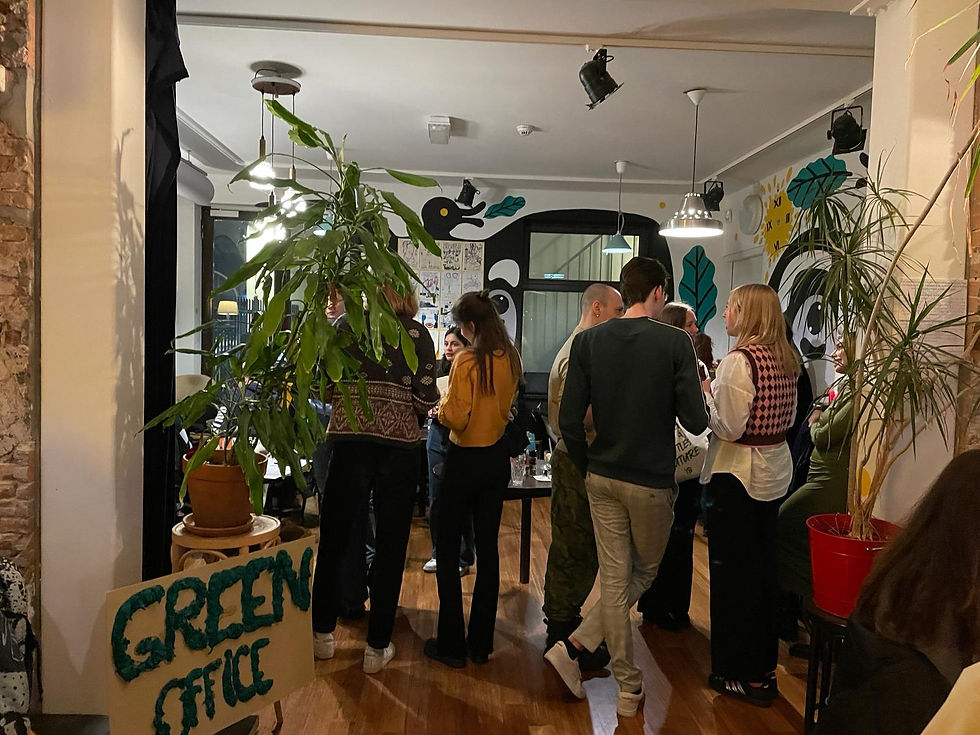Dress to Impact
- Green Office

- Feb 15, 2019
- 3 min read
Updated: Apr 14, 2020
Clean Up Your Wardrobe: Dress to Impact
a Fashion Event with the Unicef student team from Amsterdam



We are constantly moving towards living more sustainably. We are trying to make the right choices, when it comes to food, our choice of transportation and our next travel destination. However, when it comes to fashion, things sometimes seem a bit more complicated. Multiple brands are offering green fashion pieces now, but how sustainable can it be to buy newly produced stuff? Well, do we then have to ban the fast fashion pieces from our wardrobe altogether? Is it only shopping in second hand shops from now on?
To answer some of those questions and give a little inspiration on how to include a sustainable component into the daily dressing up, the UNICEF Student Team Amsterdam and the UvA Green Office organized the Dress to Impact fashion show event last Tuesday at CREA.
“One of the reasons we tend to not care so much about sustainability and organic products when it comes to dressing ourselves, is that we do not directly get in touch with clothes”, explained Merunisha Moonilal, a special guest who agreed to join the event as a speaker, “it’s not like we put the clothes in our body, like we do with food”. The experienced sustainable fashion and textiles professional with over 15 years of experience working in the apparel and fashion industry pointed out that while we spend a lot of time thinking about products that are closely connected to our body, like food or cosmetics, clothing is not directly associated with any consequences for our body. Therefore, we tend to not reflect about it in depth.
In a very inspirational talk about fast fashion, human rights and ecology, Merunisha urged us to remember who is responsible and actually stands behind the clothes we are wearing every day. Especially in Europe, we are progressively losing the ability and skills to create and construct products ourselves. Therefore, it becomes even more important to value what we have. Instead of constantly following the latest fashion trends, we should instead start to think about the choices we make and the impact they have. Instead of scavenging on the latest hit piece just because everyone else is wearing it, we should buy the piece that makes us happy. The piece that we are truly happy to wear more than once or twice, and also throughout the next season.
Adapting a sustainable lifestyle with regard to what we wear does not necessarily mean that our dresses have to come from the most expensive sustainable fashion brand there is. Merunisha’s message to the audience: Find your own way of interpreting sustainable fashion. It doesn’t always have to be the eco-friendly second-hand piece. Wearing a dress from a fast fashion brand is perfectly fine. Just make sure to love and wear it until it falls apart!
She also urged us to reflect on and make use of our power as consumers. Do you have a fashion brand that you love, but that still needs to work on becoming more sustainable? Don’t just boycott the brand. Don’t just point fingers! Make sure to communicate with them. Send letters. Write e-mails. Ask questions about where their clothes are made, how much the workers there get paid, and where the materials come from, and make suggestions on how to implement more “green” into their production. Help them to become the (sustainable) fashion brand you want them to be.
After a lively discussion between Merunisha and the audience, a team of models presented a collection of green Amsterdam fashion brands. One of the brands that agreed to collaborate and provided a set of pieces from their latest collection was the fashion brand Ovaries. The Amsterdam based fashion brand, which aims to create a more diverse fashion world, contributed a variety of t-shirts: “We hope that the fashion industry will become a runway for the world; representing its limitless diversity in colours, shapes, and expressions of beauty, gender, and sexuality.”Other labels that agreed to contribute were Paper Fetish, Nude Ethics and Dumenon. Of course the fashion show also included some fun vintage finds!
The inspirational talk and the fashion show did not only encourage around 100 guests to reflect about their current shopping habits, but did also offer the opportunity to get to know some of Amsterdam’s green fashion brands. Take-home message of the night: Reflect on your choices and appreciate what you already have!



